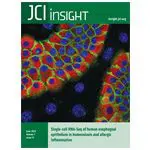CRISPR/Cas9 Engineering of Adult Mouse Liver Demonstrates that the DNAJB1-PRKACA Gene Fusion Is Sufficient to Induce Tumors Resembling Fibrolamellar Hepatocellular Carcinoma
The DNAJB1-PRKACA fusion gene is found in almost all FLC tumors. In order to determine if this gene fusion is a cause of the tumors, these researchers used a CRISPR-Cas9 technique to create a chimeric DNAJB1-PRKACA fusion gene in the livers of otherwise healthy mice. Using the CRISPR-Cas9 system, the researchers created guide RNAs that …





